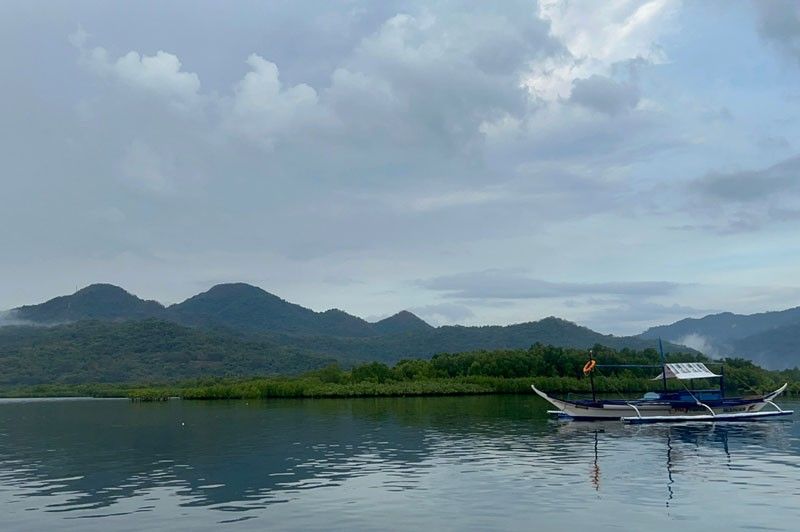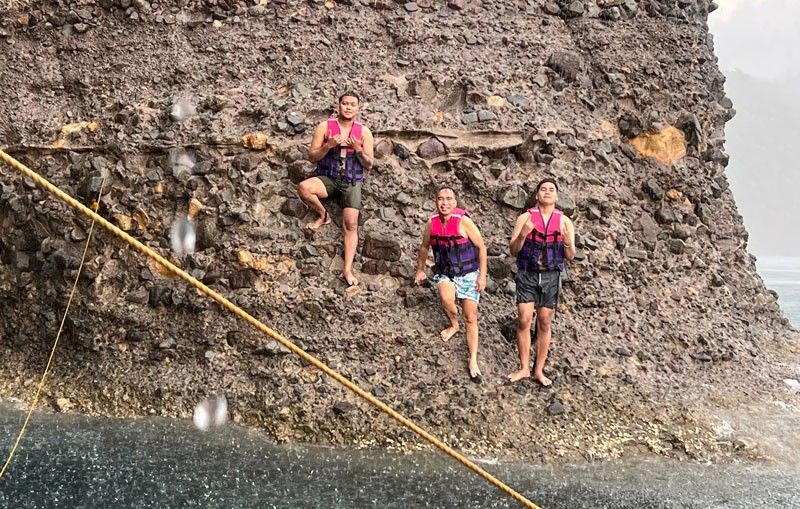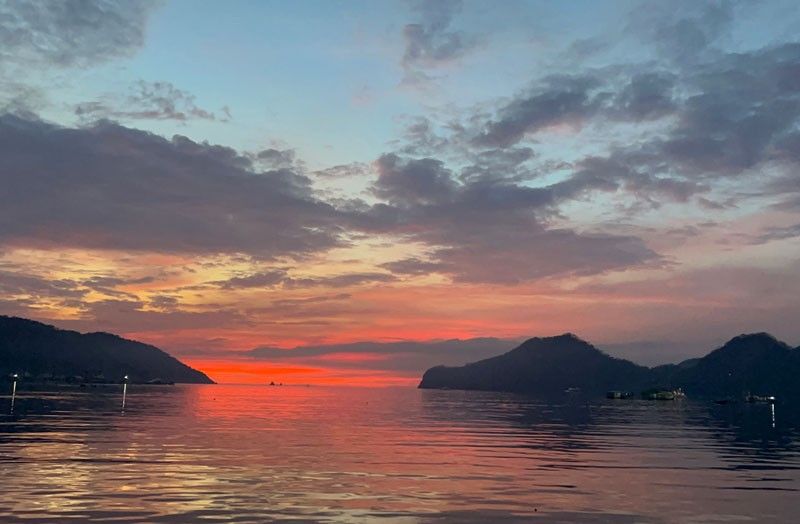On Valentine’s Day, we jumped off a cliff and survived with poetry in our hearts

With Pico de Loro mountain in the barrio of Papaya in Nasugbu, Batangas as our monolithic witness, we read poetry — by the beach, in the middle of the sea while in a motorized banca, in a secluded cove as the little waves receded to our feet.
We even had poetry in our hearts when Caloy Palomar, my best friend from Gulod, our friend and “brother” Jethro Frane, and I dared dive from a cliff in the middle of the sea, in the middle of a heavy downpour. It was Valentine’s Day, our hearts were energized by the friendship we shared. Every moment was precious. Even the rough edges of the cliff as we climbed it were poetry to our bare hands and feet. The coarseness of the rock structure did not leave any blisters on our hands and feet — only happiness. Unbridled happiness. And as we all settled on a natural platform before we jumped into the waters, our heartbeats racing, in every beat was a haiku of silent, terse prayers.
Then the jump. The distance between the edge of the cliff and the waters was a mere fraction of life; but it seemed long. Exhilarating. Freedom was achieved when fear was faced, conquered. It was literally a leap of faith. In that moment, for us, cliff diving was both a gamble and a blessing. It was poetry in motion when we felt our bodies splashing into the deep. Then life began anew as we bobbed up and down on the surface, buoyed by our life vests, buoyed by life and our love for it.

“We’re just a drop in the bucket,” Jethro said, introspecting about life as we did our island hopping. The juvenile poet in him began to show when he started talking in the banca about the greatness of nature, which “God created.” Jethro, from Canlubang, Laguna and a Business Administration classmate of Caloy in St. Vincent College of Cabuyao, is a soulful young man. He told us that on many nights, he sleeps with the urn of his mom in his embrace. His mom died of COVID in July last year.
COVID survivor Caloy, on the other hand, reflected: “That’s why we can live a beautiful life because of God.” Caloy has been my constant ally in the barrio of Gulod, whose topography in itself is serene and stationary poetry because it is sandwiched by Laguna Lake in the east and a vast rice field in the west. He and I have always had each other’s back since 2018 when I became an adviser of his group that ran for the Sangguniang Kabataan election. In his heart resides the dream of making it better in life because he wants to make his family’s life better, too.
***
Last Christmas, on our way to Padre Pio Shrine in Sto. Tomas, Batangas, I introduced Caloy and Jethro to the poetry of Allan Popa and Jerry B. Gracio, two contemporary Filipino poets that I always read.
While battling the Christmas traffic in Batangas, Jethro started with Gracio’s “Nawiwindang tayo kapag umiibig.”
Nawiwindang tayo kapag umiibig
Parang nabubuang kung bilog ang buwan
Naghahanap tayo ng mga dahilan kahit alam nating walang kahulugan
Ang mga damdamin, ating dinaramdam.
Caloy, our pilot, while on a complete stop because of the gridlock on the road, read Gracio’s poem “Ayaw kong iasa sa iyo ang aking pandama.” His young soul grew nostalgic.
Ayaw kong iasa sa iyo ang aking pandama
Ngunit hindi ko maikakaila
Ikaw ang pinakamalalim kong lumbay
Ang pinakamababaw na ligaya.
As our car crawled, I turned to Gracio’s “Dahil tinotoyo ka na naman.” I had both a smile and a frown on my face when I read it.
Dahil tinotoyo ka na naman
Sa di malamang dahilan at iniisip ko na lang
na abala ka sa maraming gawain
o hindi makakain ng maayos
dahil masakit pa ang kabubunot na ngipin
kaya puro okay ang sagot mo
sa mga tanong ko
kahit kahit alam kong hindi okay ang okay mo…
Caloy and Jethro asked why poetry in general is melancholic. I explained that many of the poems I like are about love — and love makes people happy… and sad. And happy again.

Poetry is the love that is lost and found and lost again. And found again. It is the lilting voice in the head that says — move, shake it. And the voice emboldens the body to act according to the whim of the mind. The heart obliges.
Poetry is the strength of the weak; the weakness of the strong, ardent and zealous soul.
Poetry talks to the self. To love the self is in itself a haiku and a sonnet. Love yourself. That’s the shortest poem I have ever said. Love yourself.
Pain is poetry masquerading in listlessness. It cuts the soul until it bleeds with words unspoken. Pain, too, is a prayer. In the flood of grief, it is grace that presents love — however difficult, however different. In its ebbing is forgiveness, akin to renewed love.
Love is poetry’s muse — it always comes prancing, dancing in delight or sorrow. What begins with love, ends with love. The in-between is necessary.
***
On Valentine’s Day, in Balombato Beach, stark and Spartan in appearance like the rest of the adjacent resorts in the barrio of Papaya in Nasugbu, we read Allan Popa’s poetry by the beach, inside our tent, in a banca moored on the shore.
“Madaling-araw” and “Patintero” for Jethro; “Ang aking mga kamay” and “Amorseko” for Caloy; and “Sa Kasalatan” and “Ang lahat ng daan ay daang pauwi” for me. (Our other friend who completes our quadro in Cabuyao, Jay Barela, joined in our New Year’s poetry session by reading Popa’s “Ang ating mga yapak” and “Dahil sa iyo.” Jay is also one deep, young soul.)
The poems of Allan Popa, on the day when hearts were celebrated, cut like a knife. They provided pain and little to nil consolation in words strewn like stars in the night. We felt the pain of Popa’s poetry.
We also felt the joy and peace of friendship, with nature as our date. That’s enough to keep us on a high —higher than the cliff from where our spirits jumped with poetry as our wings and buoys.
(For your new beginnings, e-mail me at [email protected]. I’m also on Twitter @bum_tenorio and Instagram @bumtenorio. Have a blessed weekend.)
- Latest


























